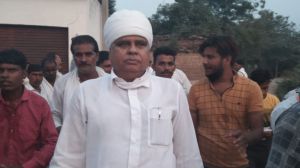A Shortfall in Imagination
...

| On Wings of Butterflies By Kavery Nambisan Penguin India Price: Rs 200 |
Twenty-two years after Midnight8217;s Children, five years after Arundhati8217;s Booker, the patina of Indo-Anglian writing is wearing slightly thin. If the publishing upsurge has produced many fine voices, it has also made it easier for mediocrity to find a place. For every original writer it has thrown up, Indian fiction in English has produced at least four others who simply make up the numbers for the so-called boom. What is gained on the roundabout is lost on the swing as Indian writers pen themselves into a corner, competing not with world literature, but with the idea of India in India.
Kavery Nambisan is an excellent writer, but she subscribes to all the cliches of subcontinental writing. Look for it and it8217;s there: The tired devices of magic realism, the orientation towards women, the take on start-small-aim-high corrupt politicians, the swipe at the godmen.
Yet it needn8217;t have been like this. On Wings of Butterflies begins with an audacious, outrageous idea: The union of all women, the largest minority, into a force that will change the world. The possibilities are excitingly endless, far more conducive to the narration of a broad spectrum of tales than the familiar long-distance train journey or the family saga. Nambisan8217;s sweep is wide, she draws in Heera-Panna of the Mahim gali and Megha Dasi, the Vrindavan widow, with as much ease as she includes the honorary Rani of Kantipur and Kripa Kagal, jewellery designer and politico wife. For all their varied backgrounds, the executive council members of WOW Women Or Women have in common a violent/unsatisfying/non-existent sex life.
This, then, is where it all begins, in the abuse of women by men in the bedroom, on the streets, in the brothel and at home. This is what WOW must fight by bringing together women across the country. The unlikely motivator is 22-year-old Eva, scarred by the sexual abuse her mother suffers into planning an 8216;8216;All-Women Political Party that will throw out the cretins who rule us and bring in our own people8217;8217;.
If the baggage of 8216;8216;our own people8217;8217; and their definitions of feminism make up the bulk of the book, it is the finely etched background figures 8212; the shadowy Milar in her white mansion so reminiscent of umpteen Isabel Allendes, the eccentric Aunt Foot, the wise Trilokasundari, the luminiscent Jyotika, 8216;Magenta Mouth8217; Lividia 8212; that keep the pages turning. The men are necessarily wallflowers, falling into either 8216;brute8217; Dinu Kagal, 8216;wimp8217; Chetan, Geekay or 8216;Best of Men8217; Hiten Pushpa Chand categories and quite happy to be so slotted.
But it is as the novel rises to its crescendo that Nambisan8217;s pen seems to falter; the tension of the WOW convention dissipates into a confused medley of events before finally collapsing in the predictable resolution of the man/woman conflict in the children.
The imagination that takes wing with the tales of Megha Dasi, Kripa Kagal and Lividia King suddenly falls short, the savage humour gives way to a reconciliation that is at best far-fetched, at worst, tepid.
Beginning the third and last section, Nambisan quotes G.K. Chesterton, 8216;8216;Angels can fly because they take themselves lightly8217;8217;. One wishes On Wings of Butterflies had followed this advice.
- 01
- 02
- 03
- 04
- 05































